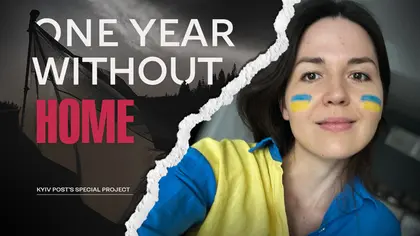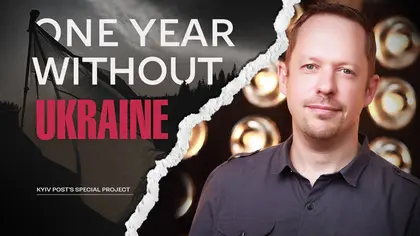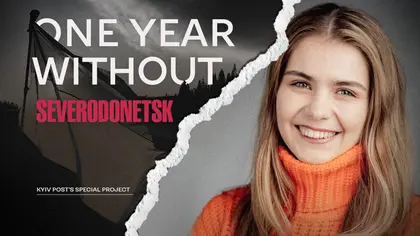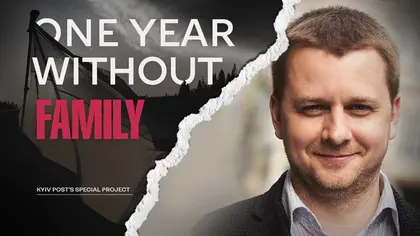Today is the one-year anniversary of Russia’s brutal, unprovoked, full-scale invasion of Ukraine. To mark the occasion, Kyiv Post has collected 17 stories to try and convey the breadth and scale of the loss caused to Ukrainians caused by the Kremlin’s aggression.
JOIN US ON TELEGRAM
Follow our coverage of the war on the @Kyivpost_official.
According to the psychologist and economist Daniel Kahneman, most human beings are likely to choose a gamble over a sure thing in a negative situation. In a positive situation, they are likely to choose the sure thing. In a situation of a war, it is unclear which option is safe and which option is a risk. Everything is a risk, so which one do you choose?
On Feb. 24, 2022, bombs started dropping across my country. I was in the Kyiv region, just 30 kilometers from the Hostomel Antonov Airport, where Russian paratroopers would land just a couple of hours later. But I had no time to assess the situation on the ground and the pros and cons of either decision.
Within the one hour it took for my British partner, Jez, and my dad to load up the car with petrol, I had to decide whether I was fleeing Ukraine with Jez or staying put with my family in my country.
I won’t carry on the suspense for much longer – read the headline of this article or Google my name, and you’ll know which one I chose. But to break down the decision-making process for you: it was choosing between my partner and my family. By going with one of these options, I didn’t know when I would see the other again. And so, now I have not seen my family and not been at home for a year.
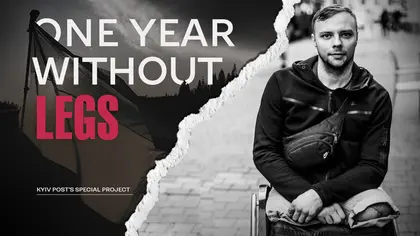
One Year Without Legs
That morning of Feb. 24 will long stay a nightmare in my memory. Being shaken awake, told that we needed to get out and having an hour to pack. Then not being able to say goodbye to my brother, my mum, my 91-year-old Grandma, my uncle and auntie, and my cousins.
The journey out of Kyiv took Jez and I two days. Ten hours to get to Lviv, a couple of hours of sleep, and then nearly 30 hours of queuing at the Ukrainian-Polish border. We made it to Medyka, a Polish village on the border at 10 a.m. on Feb. 26. As my partner is British and has a home in Manchester, we knew where we wanted to end up. But the Home Office lost my tourist visa that I applied for a couple of weeks prior and so, even after arriving in the safety of Poland, it took me four additional days to acquire the legal right to enter the U.K. I flew in on March 2, 2022 and, bar one short holiday in Bosnia and Herzegovina and one work trip to Poland, I have stayed in the U.K. ever since.
The first few weeks of living in the U.K. were a blur, as we spent them traveling between Manchester and London, giving out dozens of interviews about what it was like to spend 40 hours at the border. Then it came – reality struck me. We were dining in a nice Indian restaurant, and Jez showed me a video of a bombed Borodyanka in the Kyiv region, just 45 kilometers from my home: buildings turned into ashes.
That was the first time the full scale of what was happening hit me. A good eight days later, I was in central Manchester surrounded by people celebrating hen-dos and billboards advertising artists’ new albums. “Wait, life goes on here?!” I thought . The feeling was similar to that of grief - a complete disbelief that the sadness and shock I had been feeling for many hours was not shared by other people.
One area where I was lucky - I didn’t have a massive culture shock. I had come to a country where I had studied and lived before. I speak English fluently. Five years spent in an English school and university, followed by six years working as an English-language journalist in Ukraine, one can see why it was relatively easy for me to adjust. But I also had my partner with me when most other Ukrainians coming to the U.K. (of which there are now around 150,000) were arriving without any knowledge of English, friends, or an understanding of the country. In peaceful times, a visit to the U.K. is a very costly affair for a Ukrainian passport holder.
So, I try to help others. In mid-May 2022, I already held my first free Manchester walking tour in Ukrainian, together with Free Manchester Walking Tours. To this day, I’ve introduced more than 400 Ukrainians to this city and vice versa. I’ve helped match Ukrainians with hosts and I also signed up with a couple of interpreting agencies to translate for Ukrainians in the north of England in the fields of housing and healthcare. And even though I'm now in the U.K. on a family visa, I navigated the Homes for Ukraine system by hosting my mother. So my partner and I have been feeding into the government and local authorities about the flaws of the system. And I’ve continued to fly the flag for Ukraine and report on the issues Ukrainians are facing for outlets like ITV, BBC, Reader’s Digest, Business Insider, Byline Times, and many others.
I still don’t know whether I made the right choice by leaving my home. I followed my British partner for whom this was a no-brainer. He wasn’t leaving his family and life behind. In fact, the opposite: he was returning to his normal life. I’m constantly hit by sorrow and shock. Like when I wake up and see that the Kyiv region, where my family is, had been bombed. Or when I find out that my former colleagues were kidnapped or have disappeared. Or when I found out that Maks Levin, a photojournalist with whom I worked closely for two days, was executed.
There is no sure way of avoiding the trauma: all of us, Ukrainians, are traumatized. And there is no point seeking help for it as the trauma will come back next time you’re exposed to the news cycle again. The 91-year-old (at the time) Grandma I said I was not able to say goodbye to? Well, I won't ever now, as she passed away on Christmas Day.
My partner and I will come back when Ukraine wins and we will help rebuild the country. But for now, I’m focusing my efforts on ensuring the world continues to talk about Ukraine. We’re writing a book about our journey out of Ukraine, setting up a company to give talks about Ukraine, making a documentary about rebuilding Ukraine post-victory, and, upon our return, are planning to support and advise British companies that will want to invest in Ukraine.
The views expressed are the author’s and not necessarily of Kyiv Post.
You can also highlight the text and press Ctrl + Enter


